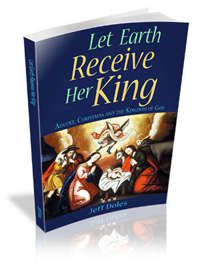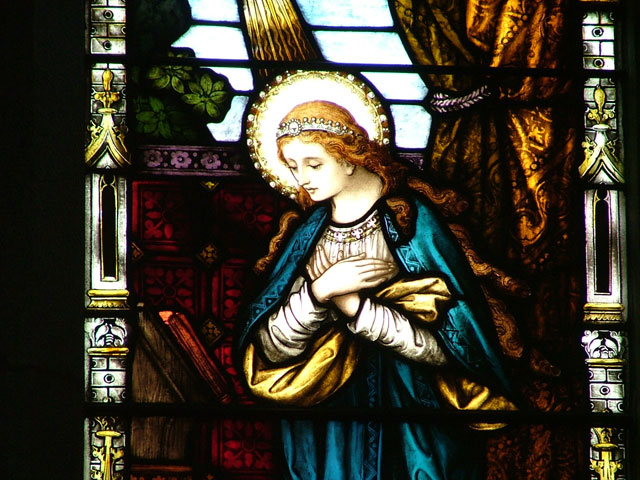He will be great, and will be called the Son of the Highest; and the LORD God will give Him the throne of His father David. And He will reign over the house of Jacob forever, and of His kingdom there will be no end. (Luke 1:32-33)
A throne and a kingdom signify a King. The birth of Jesus, His coming into the world, is the fulfillment of the promise God made long ago to David, that his descendent would forever occupy his throne. Isaiah likewise prophesied concerning the birth of this King.
For unto us a Child is born,The Magi came to Jerusalem and asked, “Where is He who has been born King of the Jews? For we have seen His star in the East and have come to worship Him” (Matthew 2:2). They were not of the house of Jacob. They were not even of the house of Jacob’s brother, Esau, from whom the paranoid king, Herod, descended. Yet, they understood that the time for the Great King had come (and it was not Herod). They had seen His star, prophesied in Numbers 24:16-17, “A Star shall come out of Jacob; a Scepter shall rise out of Israel,” and they came to give Him honor. They were of the goyim, the surrounding pagan nations — Gentiles. The kingdom and the covenant were not theirs, yet they understood that this King would be a benefit to the whole world. For just as the star could be seen in their land, so the King would arise not only in Israel but out of Israel — for the sake of the whole world.
Unto us a Son is given;
And the government will be upon His shoulder.
And His name will be called
Wonderful, Counselor, Mighty God,
Everlasting Father, Prince of Peace.
Of the increase of His government and peace
There will be no end,
Upon the throne of David and over His kingdom,
To order it and establish it with judgment and justice
From that time forward, even forever.
The zeal of the LORD of Hosts will perform this.
(Isaiah 9:6-7)
This theme of kingship carried forth in the life and ministry of Jesus. After He was baptized by John and driven into the wilderness by the Holy Spirit, where He was proved for forty days, He came preaching, “The time is fulfilled, the kingdom of God is at hand. Repent and believe in the gospel” (Mark 1:15). His healing miracles manifested the authority of this kingdom: “If I cast out demons by the Spirit of God, surely the kingdom of God has come upon you,” He said (Matthew 12:28).
Standing before Pilate, who asked, “Are You the King of the Jews?” Jesus answered, “It is as you say.” Before Caiaphas, the high priest who demanded, “Tell us if You are the Christ, the Son of God,” Jesus said, ““It is as you said. Nevertheless, I say to you, hereafter you will see the Son of Man sitting at the right hand of the Power, and coming on the clouds of heaven” (Matthew 26:64). This was a reference to the prophetic vision of Daniel:
I was watching in the night visions,When He was crucified, the charge placed above His head read, “THIS IS JESUS THE KING OF THE JEWS.” The resurrection from the dead by the Spirit of God demonstrated that King Jesus the Messiah, born of the seed of David, is indeed the Son of God (Romans 1:4-5). And before He ascended to His throne in heaven, at the right hand of the Father, Jesus came to the disciples and said, “All authority has been given to Me in heaven and on earth,” then He commissioned them to teach all nations everything He had taught them (Matthew 28:18-20).
And behold, One like the Son of Man,
Coming with the clouds of heaven!
He came to the Ancient of Days,
And they brought Him near before Him.
Then to Him was given dominion and glory and a kingdom,
That all peoples, nations, and languages should serve Him.
His dominion is an everlasting dominion,
Which shall not pass away,
And His kingdom the one
Which shall not be destroyed.
(Daniel 7:13-14)
In Revelation, He is called Pantokrator, which means “almighty” or “all-powerful,” and “King of the Saints.”
Who shall not fear You, O Lord, and glorify Your name?The coming of Jesus the Messiah into the world is the advent of the King who reigns over all.
For You alone are holy.
For all nations shall come and worship before You,
For Your judgments have been manifested.
(Revelation15:3-4)

Let Earth Receive Her King
Advent, Christmas and the Kingdom of God
by Jeff Doles
Preview with Amazon’s “Look Inside.”
Available in paperback and Kindle (Amazon), epub (Google and iTunes) and PDF.






